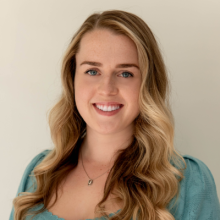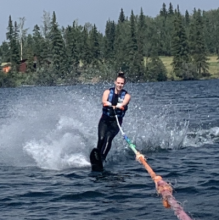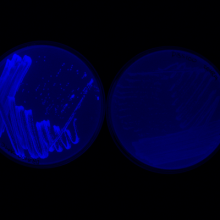Ashley Gilliland
Why did you decide to pursue a graduate degree?
Throughout my undergraduate program, I worked in microbiology research labs where I learned basic laboratory skills and was introduced to the idea of finding answers to questions that no one has asked before. My inquisitive nature has led me down the path of academia, having completed a Masters's degree and now continuing with a PhD. My developed passions in microbiology, microbial genetics, and the gut microbiome have led me to my core research goal: to understand how microbes of the gut interact with each other and with their host to maintain homeostasis and/or potentiate disease. With the rising incidence of gut-related issues in the general population such as IBD, as well as having family and friends who currently live with IBD, I am motivated to contribute my understanding of microbiology and microbial genetics to the field of IBD research and therapy development.
Why did you decide to study at UBC?
I was fortunate as a child to grow up in the greater Vancouver area and was eager to return home to continue my academic endeavors. Luckily for me, UBC is one of the top microbiology research schools in Canada and is host to a wealth of world-class researchers. UBC also provides access to cutting-edge facilities, technology cores, and networking opportunities which are instrumental in progressing research and moving the scientific community forward. Therefore, to achieve my future career goals I knew UBC would be the right choice.
What is it specifically, that your program offers, that attracted you?
My chosen supervisor is a Professor in the Faculty of Medicine therefore the Experimental Medicine program was the best fit for his research and my project. The Experimental Medicine program also offers numerous scholarships, hosts seminars, and networking events, and is home to supervisors who are instrumental in their respective fields of study making it a competitive program of study. ExMed is also diverse as it covers all topics related to human disease, allowing for collaborations and obtaining a range of knowledge that can be limited when programs are highly specific.
What was the best surprise about UBC or life in Vancouver?
While this wasn't really a surprise, I was most appreciative that Vancouver winters are not nearly as long, cold, or dark as Edmonton winters. One of the best surprises I had when coming to UBC was how kind, helpful, and welcoming all of the students, researchers, and core staff are. It can be intimidating coming to a world-renowned university and joining a lab that is 5 times larger than your previous labs, however, that intimidation quickly dissolved when I was met with a supportive community that I am thankful to be a part of.
What aspect of your graduate program do you enjoy the most or are looking forward to with the greatest curiosity?
I am most excited to continue my research project and hopefully make meaningful contributions not only to the scientific community but also to people who are currently living with IBD. As a currently incurable disease, I am intrigued by the nuanced challenges that come with studying this multi-factorial disease and will work exceedingly hard throughout the duration of my program keeping in mind the people that my research could positively impact.
What do you see as your biggest challenge(s) in your future career?
I believe the biggest challenge I will face in my career will come from balancing personal and career goals. I aspire to become a faculty researcher at a university in British Columbia so that my family and I can continue to live in the province we consider home. While being geographically restricted, I am working hard to develop my skills as a researcher and earn the recognition required to achieve my career goal.
How do you feel your program is preparing you for those challenges?
By being a member of the UBC community, I am provided with the opportunity to establish myself as a competent and successful researcher which could help with pursuing a career in academia at a university in British Columbia. In addition, with the support of my supervisor, committee members, and program, my success in my PhD program will help secure future opportunities as I look beyond graduate school.
What aspects of your life or career before now have best prepared you for your UBC graduate program?
I was a member of three unique labs while completing my Bachelor's degree which helped prepare me for the life and expectations of a graduate student as well as provide me with the experience required to be successful in graduate school. In between my bachelor's and master's degrees, I worked in the industry as a Microbiology Analyst where I learned valuable skills in SOP management, customer relations, and industry standards. My experience in industry cemented my interest in research and showed me that academia would be the career path that I would find most fulfilling. Lastly, completing my Masters's degree at the University of Alberta provided me with the opportunity to publish original research findings, prepare a thesis, and teach undergraduate courses, which prepared me not only for pursuing my PhD at UBC but also provided the foundation with which I am building my academic career upon.
What do you like to do for fun or relaxation?
I like to enjoy the outdoors whether that’s a walk after work, watching sunsets at the beach, or going camping on long weekends to take full advantage of the beautiful province I live in. I enjoy water sports like skiing and wakeboarding and won’t say no to patio evenings with friends and family.
What advice do you have for new graduate students?
I would advise new graduate students to ask for help, spend meaningful time planning their next steps, and don’t be afraid to make mistakes. Research is often met with unforeseen challenges therefore perseverance and grit are necessary to be successful in your program. Also, take advantage of networking with important people in your field to access the years of experience and knowledge they have developed throughout their careers. Academics can sometimes be hard to approach, but most want to share all that they’ve learned to help guide them through their degree and careers.


